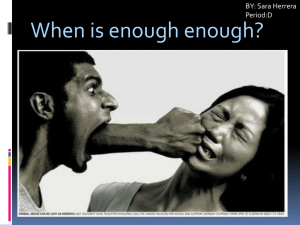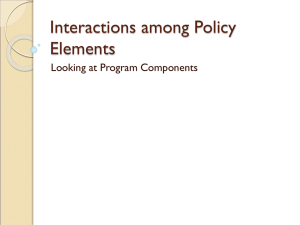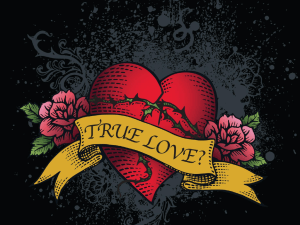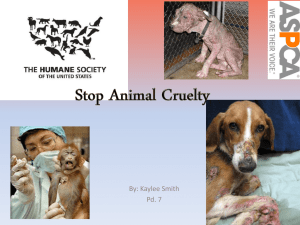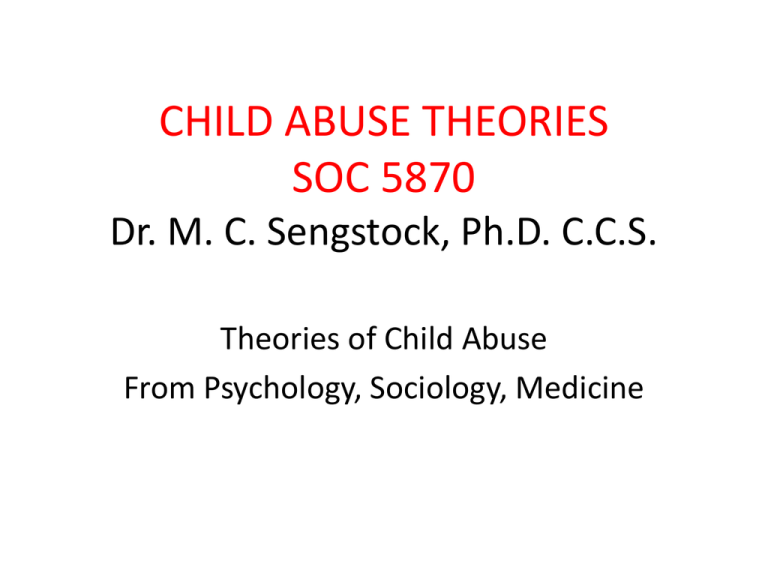
CHILD ABUSE THEORIES
SOC 5870
Dr. M. C. Sengstock, Ph.D. C.C.S.
Theories of Child Abuse
From Psychology, Sociology, Medicine
Categories of Theories & Applications
• Explanatory Theories
– Psychological Theories
– Environmental Models
– Life Crisis Theory
– Social Learning Theory
– Family Dynamics Theory
– Social Psychological vs. Psychodynamic Models
• Theoretically Based Attempts to Correct
Abusive Parental Behavior
• Public Issues
Psychological Theories
of Child Abuse (#1)
• Mental Illness Model:
– Child Abuse Unthinkable – Abusers Mentally Ill
– May Be True of Most Extreme – <5% (Kempe)
• Parent As Deprived Child:
– Abusive Parent Was Never Loved As Child
– “Hostility Sponge” – Take Anger Out On Children
– Therapists Must Supply This Missing Love
• Psychological (Character Trait) Models:
– Lists of Traits of Abusive Parents (cf. Lists Below)
Adults Who Abuse Children:
Psychological Characteristics (EX 1)
• They Have Mental or Psychological Problems:
– Self-Expressed Anger
– Anger Control Problems
– Depression – Anxiety
– Low Tolerance for Frustration
– Low Self Esteem
– Rigid in Their Views
– Deficit in Empathy – “Taking Role of the Other”
Psychological Characteristics (EX 2)
• Many Family & Interpersonal Problems:
– Marital Problems
– History of Having Been Abused Themselves
– Deficits in Positive Interactions With the Child …
– & With Other Family Members
– Tend to Be Isolated
– Also Try To Isolate the Family From Outsiders to
Hide Their Behavior
Psychological Characteristics (EX 3)
• Abusive Parents Also Tend to Have:
– Physical Health Problems
– Perceive Life in General to Be Stressful
– May Have Substance Dependence or Abuse
– Tend to Have “Physiological Over-Activity” …
– I.e., Tend to Have a Physiological Reaction When
Child Misbehaves – Unable to React in a Rational
Manner
Psychological Characteristics (ctd)
• Difficulties in Parenting:
– Unrealistic Expectations of Children (Jackson Prison)
– Tend to Disregard Child’s Needs
– Poor Child Management Skills (Little Training)
– Poor Problem-Solving Skills With Children
– Inconsistent in Approach to Parenting
– See Parental Role As Stressful, Intrusive
– View Children In Negative Manner
– Little Communication, Interaction with Children
Psychological Theories
of Child Abuse (#2)
• Psychodynamic Model: “Mothering Imprint”
– Focuses on MOTHER’s Early Childhood Experience
– MOTHER Must Have “Bonded” With HER Mother
in 1st 24 Hours of Life
– If She Did Not, She Can NEVER Bond With Anyone
Ever – Including Her Own Child!
– If True, No Adopted Child Could Ever Bond
– No Child of the 50s – When Children Were Place in
Nurseries Immediately – Could Bond Either!
Psychological Theories
of Child Abuse (#3)
•
•
•
•
•
•
•
•
•
Authoritarian Personality Theory
Developed by Adorno to Explain Nazi Horrors
Nazis Never Developed Internal Social Control
Dependent On Outside Control (Police)
Assume Everyone Else Is Like That
Children Must Have Outside Rules …
& Severe Punishment If They Are Broken
Develop Minor Rules, Severe Punishments
May Apply to Some Very Severe Abuse
Environmental Models (#1)
• Socio-Economic Model:
– Assumes Abusive Parents Lower Class
– Have the Stresses of Lower Class Life
– Cure Child Abuse By Curing Poverty
– Also Give Birth Control Information
– Problem: Not All Abusive Parents Are Lower Class
– Some Lower Class Parents Are Model Parents
Environmental Models (#2)
•
•
•
•
Linkage Theory (M. Straus)
Adaptation of Environmental Model
Lower Class Parents Know Life Is Difficult
Attempt to Teach Child to Be Tough to Deal
With the Stresses of Adult Life
• Support for Theory: Lower Class Parents Who
Send Kids to College Are Less Abusive
• Straus Does Not Use This Theory Anymore
Life Crisis Theory
• Suggests Abusive Parents Are Over-Stressed
– Numerous Stressful Events
– Not Any Single Stress (Such As Poverty)
– Sample Stresses: Divorce, Job Change, Marriage,
New Baby, etc.
– Holmes & Rahe Stress Scale
• Abusive Parents Do Have More Stresses
• Abused Elders Have Similar Stress Levels
• Many High Stress Families Do NOT Abuse
Social Learning Theories
Focus: Parents Learning About Child Rearing
• Inadequate Learning Theory:
– Inadequate Knowledge Re Normal Behavior
– Unrealistic Expectations of Children
– Lack Knowledge of Child Management
• Adequate Learning – Wrong Kind
– Parents Have Clear Ideas About Children
– Committed to Using Severe Punishments
– Often Based on Religion or Family Traditions
Family Structure Models
• Family Setting Plays Role in Child Treatment
– Family Interaction Patterns Play Role:
– Parents Influence Each Other RE Child Mgmt
• Family Dynamics:
– Family Interactions Affect Child Management
– Unstable Triad: Father – Mother – Child
– Childhood Alliances
– Can Produce Problematic Child-Rearing
Social Psychological Model
(vs. Psychodynamic Model)
Richard Gelles’ Model – Complex Factors:
–
–
–
–
–
Social Status of Parent (Age, Sex, SES, Ethnic)
Class/Community Values (Violence, Children)
Parents’ Socialization Experiences
Situational Stress (Structure; Stress from Child)
Psychodynamic Stress (Mental Problems; Substance
Abuse; Personality Control)
– Immediate Precipitating Situation (Argument,
Household Event, Child Misbehavior)
– Child Abuse (Single; Repeated; Physical; Psychological)
Correcting Abusive Parental Action
Several Approaches, Including:
• Systems Approach
• Dealing With Parental Stress
• Joint Approach With Parents
• Training in Child Rearing
• Anti-Isolation
• Alternate Tension-Release Mechanisms
Systems Approach
• Does NOT Look At Any Single Factor
• Focuses On Numerous Factors:
– Family Life
– Community Factors
– Economic Environment
– Extended Family Influences
– Economic Influence of Other Parents
Dealing With Parental Stress
Assumes Abusive Parents Are Unhappy People:
• Abusive Parents Feel Unloved
• “Mothering the Parent”:
– Therapists Help Parents Deal With Their Issues
– Sadly, Some Issues Take Years to Resolve
• EX: PACT Mother & Sons:
– Mother’s Counselor: Don’t Remove Kids!
• What To Do With Children In Meantime?
Joint Approach With Parents
• Some Counselors Refuse to See Just 1 Parent
• Assume BOTH Parents Involved
– EX: Mother Abusing Child(ren)
– Husband Abusing Mother, or …
– Husband Goading Mother to Improve Child’s Behavior
• Treating Only 1 Parent Is Useless
• Wife Comes Home to Husband’s Criticism:
– “When You Gonna Get Yer Act Together So the Kid
Comes Home?”
Training in Child Rearing
• Help Parent Understand Normal Child
Behavior
• Help Parents Deal With Misbehavior in More
Constructive & Non-Abusive Manner
• Many Parents Have Unrealistic Expectations
About Children Providing Satisfaction
• Help Parents Relinquish These Expectations &
Find Other Outlets for Personal Rewards
Anti-Isolation
• Many Abusive Parents Are Essentially Isolates:
– Have Few Adult Friends
– No One to Call Upon In Times of Difficulty
– “Agoraphobia” – Very Uncomfortable With People
– Some Therapists Will Only Use Group Therapy
• Aim to Give Members Experiences Working
with Others
– EX: Week’s Assignment: “Go Out & Get Mail!”
Alternate Tension-Release
Mechanisms
• Teach Parents Alternative Mechanisms for
Dealing with Tensions – Other Than Violence
• Different from Psychoanalytic Method –
Which Contends That Aggressive Feelings
Must Be Expressed to Get Rid of Them
• Help People (Adults & Children) Deal with
Frustrations Without resorting to Violence
• UNREALISTIC to Attempt to Avoid Stress &
Scary Stories – Must Learn to Deal With Them!
Public Issues Related to Child Abuse
U.S. Society Has Ambivalence Re Child Abuse
3 Dimensions
• Ambivalence in View of Parents & Children
• Ambivalence Re Dealing With Child Abuse
• Ambivalence Re Physical Punishment
Ambivalence in View of
Parents & Children
• Outrage at Abuse – Consider Abusive Parents
to Be Crazy Monsters …
BUT
• Protective of Parents’ Rights – Reluctant to
Take Any Measures to Interfere in A Parent’s
Decisions Regarding His/Her Children
Uncertainty RE Dealing With Child Abuse
•
•
•
•
•
•
What To Do When A Parent Is Abusive?
Take Child From Parent(s)?
How Bad Does Abuse Have to Be to Remove?
What To Do With Child Once Removed?
Who Should Have Custody? Relative? Foster?
Who Should Pay for His/Her Care?
How to Decide When Should Child Be
Returned to Parents?
Ambivalence Re Physical Punishment
• U.S. Society Clearly Disagrees With Extreme
Physical Punishment to Endangerment
• Most U.S. Parents Clearly Believe That Physical
Punishment is Necessary for Raising Children
Adequately
• Considerable Disagreement Over Point at
Which “Punishment” Moves From
“Normal” to “Extreme”
Problems With the System
System Problems Re Child Abuse Management:
• Reporters Often Uncertain Re Process
• Administrators Prefer Internal Reports – 2011:
–
–
–
–
Penn State Football Asst Coach Jerry Sandusky
Sexually Abused Several Young Boys
Reports Only Sent to Coach Paterno & Administration
State Police Frank Noonen: Never Heard of This!
• Many System Personnel Condone Abuse!
– Judge William Adams – Texas Family Court – Beat Disabled
16 Year Old Daughter, Hilary, in 2004
– Daughter’s Video Posted On-Line in 2011
Looking to the Future
•
•
•
•
How Do We Deal With Child Abuse?
Before Our Approach Will Work …
We Need to Come to Terms With Ambivalence
Reach Agreement Over Appropriate ChildRearing Practices
• What Is Appropriate Discipline?
• What Is Abusive?
• What to Do When Discipline Becomes Abuse?

